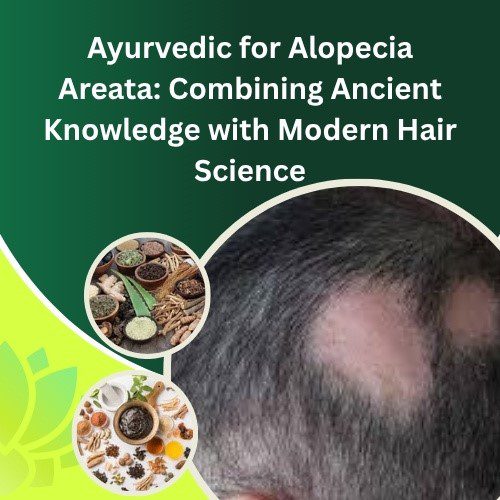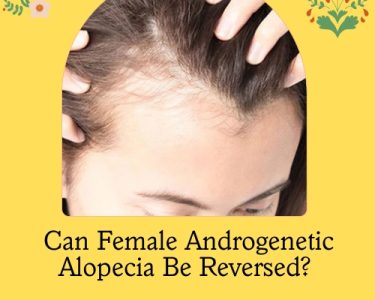Hair is often seen as a reflection of one’s identity, health, and confidence. But when hair starts to fall in small, round patches — as it does in Alopecia Areata — it can cause distress, self-consciousness, and even emotional pain. While modern medicine offers treatments like corticosteroid injections or immunotherapy, many people today are turning toward home remedies and Natural Alopecia Herbal Supplement that promote healing from within. This is where Ayurvedic for Alopecia Areata treatments come into play — a centuries-old system that blends natural herbs, oils, and holistic principles to restore balance and encourage regrowth.
In this detailed guide, we’ll explore how Ayurveda understands Alopecia Areata, what causes it from an Ayurvedic viewpoint, and how ancient herbal remedies and Natural Treatments for Alopecia Areata align with modern hair science to help manage the condition naturally.
What Is Alopecia Areata?
Alopecia Areata is an autoimmune disorder where the body’s immune system mistakenly attacks hair follicles, leading to sudden, patchy hair loss. The condition can affect not just the scalp but also eyebrows, eyelashes, beard, and other parts of the body.
Common Symptoms Include:
- Round or oval patches of hair loss on the scalp or body
- Tingling or itching in the affected area
- Thin, short “exclamation mark” hairs at the edges of bald patches
- Nail changes like pitting or ridging in severe cases
While the exact cause of Alopecia Areata remains unclear, research points to genetics, stress, and autoimmune reactions as major contributors.
Ayurvedic View of Alopecia Areata
In Ayurveda, Alopecia Areata is referred to as “Indralupta.” It falls under the category of Khalitya (hair loss disorders) and is believed to result from an imbalance in the body’s three doshas — Vata, Pitta, and Kapha.
The Ayurvedic Explanation:
- Pitta Dosha, responsible for metabolism and body heat, becomes aggravated due to poor diet, excessive stress, or hormonal imbalance.
- The aggravated Pitta weakens the hair follicles and damages the scalp tissue.
- Vata Dosha contributes to dryness and brittleness of hair.
- Kapha Dosha, when imbalanced, blocks hair follicles and hinders the supply of nutrients to the scalp.
This imbalance disrupts the natural hair growth cycle, resulting in patchy hair loss or baldness — what modern science identifies as Alopecia Areata.
Ayurvedic for Alopecia Areata: Key Principles
The goal of Ayurvedic for Alopecia Areata treatment is not merely to regrow hair but to restore balance within the body. Ayurveda focuses on eliminating the root cause through detoxification, internal healing, and nourishment of the scalp and hair roots.
Main Ayurvedic Principles for Treating Alopecia Areata:
- Detoxification (Shodhana):
Removing toxins (Ama) from the body through Panchakarma therapies like Virechana (purgation) and Nasya (nasal therapy). - Rejuvenation (Rasayana):
Using herbal tonics and Rasayana therapies to strengthen hair roots and rejuvenate scalp cells. - Nourishment (Poshana):
Applying medicated oils and consuming nutrient-rich foods to restore vitality to the hair. - Lifestyle Correction:
Managing stress, improving digestion, and ensuring restful sleep are all part of a holistic approach.
Top Ayurvedic Herbs for Alopecia Areata
Ayurveda offers a treasure trove of herbs known for their hair-strengthening and regenerative properties. Below are some of the most effective herbs recommended in Ayurvedic for Alopecia Areata treatment.
Bhringraj (Eclipta alba) – The King of Hair Herbs
Bhringraj is widely known in Ayurveda for promoting hair regrowth and reducing hair fall. It nourishes the scalp, improves blood circulation, and strengthens hair follicles.
How It Helps: Its natural anti-inflammatory and antioxidant properties rejuvenate hair follicles affected by autoimmune inflammation.
Amla (Indian Gooseberry)
Amla is rich in Vitamin C and antioxidants that enhance collagen production and delay premature greying.
How It Helps: It cools the Pitta dosha, improves scalp health, and promotes new hair growth.
Brahmi (Bacopa monnieri)
Brahmi is known for calming the mind and reducing stress — one of the major triggers of Alopecia Areata.
How It Helps: It improves blood flow to the scalp and strengthens hair follicles.
Neem (Azadirachta indica)
Neem has powerful antibacterial and anti-inflammatory properties that cleanse the scalp and prevent infections.
How It Helps: It detoxifies the scalp, supports hair follicle function, and reduces immune overreaction.
Ashwagandha (Withania somnifera)
Ashwagandha helps in balancing hormones and reducing cortisol (stress hormone) levels.
How It Helps: It minimizes hair loss caused by stress and promotes regrowth by boosting overall immunity.
Shikakai and Reetha
These natural cleansers gently remove buildup without stripping natural oils.
How They Help: They enhance scalp health, reduce dandruff, and encourage new hair growth.
Jatamansi (Nardostachys jatamansi)
This herb supports mental calmness and improves sleep, both essential for managing autoimmune hair loss.
How It Helps: It nourishes the nervous system and promotes healthy hair regrowth.
Ayurvedic Oils for Alopecia Areata
Ayurvedic oils are vital in any Ayurvedic for Alopecia Areata treatment plan. Regular scalp massage stimulates blood circulation, strengthens hair roots, and encourages natural growth.
Best Ayurvedic Oils to Use:
- Bhringraj Oil:
Improves hair density and prevents premature balding. - Brahmi Oil:
Reduces stress-related hair fall and nourishes scalp tissues. - Amla Oil:
Rich in antioxidants and Vitamin C for shiny, strong hair. - Neem Oil:
Cleanses scalp impurities and prevents microbial infections. - Coconut and Castor Oil Blend:
Enhances absorption of herbs and moisturizes the scalp deeply.
How to Use:
Warm the oil slightly and massage into the scalp in circular motions for 10–15 minutes. Leave it overnight or at least 1–2 hours before washing with a mild herbal shampoo.
Ayurvedic Diet for Alopecia Areata
In Ayurveda, food is medicine. To correct the internal imbalance that causes hair loss, one must follow a diet that pacifies aggravated doshas and supports healthy digestion.
Dietary Guidelines:
- Eat fresh, home-cooked meals rich in proteins, iron, and antioxidants.
- Include: Green leafy vegetables, sesame seeds, lentils, ghee, amla, turmeric, and nuts.
- Avoid: Spicy, oily, or processed foods that aggravate Pitta.
- Drink: Herbal teas made with tulsi, ashwagandha, or licorice root.
- Stay hydrated: Drink at least 8–10 glasses of water daily.
Sample Ayurvedic Diet Plan:
| Time | Meal | Example |
| Morning | Detox drink | Warm water with turmeric and honey |
| Breakfast | Light meal | Oatmeal with almonds & raisins |
| Lunch | Balanced meal | Khichdi, sautéed greens, ghee |
| Evening | Herbal tea | Brahmi or ashwagandha tea |
| Dinner | Early, light meal | Vegetable soup with chapati |
Panchakarma Therapy for Alopecia Areata
Panchakarma, the Ayurvedic detoxification therapy, helps remove deep-seated toxins and restore doshic balance.
Effective Panchakarma Therapies:
- Virechana (Purgation): Clears excess Pitta from the system.
- Nasya (Nasal Therapy): Herbal oils are administered through nostrils to strengthen hair follicles.
- Shirodhara: Warm oil poured on the forehead to relieve stress and balance hormones.
- Shiro Abhyanga: Head massage with medicated oils for nourishment and relaxation.
When combined, these therapies improve scalp blood flow, calm the nervous system, and stimulate natural hair regrowth.
Modern Hair Science Meets Ayurveda
Modern dermatology acknowledges that stress, poor nutrition, and autoimmune responses play major roles in Alopecia Areata. Interestingly, Ayurvedic for Alopecia Areata treatments address these exact factors — stress management, detoxification, and nourishment — through a natural, multi-dimensional approach.
Scientific Evidence Supporting Ayurvedic Ingredients:
- Bhringraj Extract: Studies show it promotes hair follicle activity and increases hair count.
- Ashwagandha: Clinically proven to reduce cortisol levels and improve hair growth.
- Amla: Demonstrates antioxidant properties that protect hair follicles from oxidative stress.
- Neem: Shown to modulate immune response and reduce inflammation.
Combining these time-tested herbs with modern hair science — such as low-level laser therapy, nutrient supplements, or platelet-rich plasma (PRP) — can deliver optimal results for hair regrowth.
Lifestyle and Stress Management
Ayurveda emphasizes that mental and emotional health directly affects hair growth. Stress can aggravate the Pitta dosha and trigger autoimmune flare-ups.
Ayurvedic Lifestyle Tips:
- Practice Yoga and Meditation: Especially poses like Shirsasana (Headstand) and Pranayama (breathing exercises) to improve scalp circulation.
- Sleep Well: Get at least 7–8 hours of restful sleep daily.
- Avoid Harsh Hair Treatments: Chemical dyes, heat styling, or tight hairstyles can worsen hair loss.
- Maintain Routine: Follow a consistent sleep, eating, and exercise pattern to maintain dosha balance.
Home Remedies Based on Ayurvedic Principles
Because the hair loss can be temporary or permanent, it can be a little too risky to not go for treatment. One of the best options for you would be to go for natural and home remedies. So here are Best Alopecia Areata Treatment Natural Remedies proven to help with hair growth and some more you can experiment with.
1. Bhringraj Hair Mask
Mix Bhringraj powder with coconut oil and a few drops of lemon juice. Apply to the scalp and leave for 30 minutes before washing.
Benefit: Promotes new hair growth and strengthens roots.
2. Amla and Neem Paste
Grind fresh amla and neem leaves into a paste, apply to bald patches, and rinse after 20 minutes.
Benefit: Detoxifies scalp and boosts follicle regeneration.
3. Fenugreek (Methi) Hair Pack
Soak fenugreek seeds overnight, grind into paste, and apply to scalp.
Benefit: Strengthens hair shafts and stimulates dormant follicles.
Precautions and When to See a Doctor
While Ayurvedic for Alopecia Areata treatments are safe and natural, severe or rapidly progressing cases should be evaluated by a dermatologist. Sometimes, combining Ayurveda and Natural Treatment for Alopecia Areata with medical treatment can provide the best outcomes.
Seek medical help if:
- You experience widespread hair loss
- There is visible inflammation or scarring on the scalp
- Hair loss is accompanied by other autoimmune symptoms
Conclusion
Ayurvedic for Alopecia Areata represents a perfect blend of ancient wisdom and modern science. Rather than masking symptoms, Ayurveda focuses on restoring inner balance — detoxifying the body, reducing stress, and nourishing hair roots naturally. Herbs like Bhringraj, Amla, and Ashwagandha not only stimulate hair regrowth but also improve overall health and vitality.
When combined with modern diagnostic tools and nutritional insights, Ayurvedic principles can create a holistic and sustainable path toward recovery from Alopecia Areata. Whether used alone or as a complement to conventional treatments, Ayurveda offers hope — and healthy, natural regrowth — to those battling this challenging condition.




